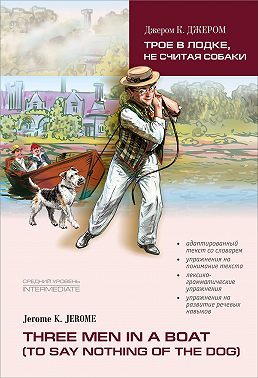- Главная
- Прочая образовательная литература
- ⭐️Джером Джером
- 📚«Three men in a boat / Трое в лодке, не считая собаки. Книга для чтения на английском языке»


Отсканируйте код для установки мобильного приложения MyBook
Премиум
Three men in a boat / Трое в лодке, не считая собаки. Книга для чтения на английском языке
209 печатных страниц
Время чтения ≈ 6ч
2019 год
16+
Эта книга недоступна.
Узнать, почемуВ данном издании вниманию читателя предлагается адаптированная и сокращенная версия известнейшей повести Джерома К. Джерома «Трое в лодке, не считая собаки». Автор описывает приключения троих друзей и их пса, отправившихся в путешествие на лодке по реке Темзе. Книга остается любимой поколениями читателей благодаря искрометному юмору Джерома. Текст снабжен лексическими и культурологическими комментариями. Упражнения направлены на отработку навыков, касающихся различных аспектов языка: расширение словарного запаса, освоение правильного произношения, проверку понимания текста. Работа над ответами на вопросы и выполнение заданий на пересказ текста дадут учащимся возможность развивать речевые навыки, а также размышлять над произведением. Кроме того, книга снабжена словарем. Пособие адресовано учащимся старших классов школ с углубленным изучением языка, студентам филологических факультетов, а также всем, кто изучает английский язык самостоятельно.
читайте онлайн полную версию книги «Three men in a boat / Трое в лодке, не считая собаки. Книга для чтения на английском языке» автора Джером Джером на сайте электронной библиотеки MyBook.ru. Скачивайте приложения для iOS или Android и читайте «Three men in a boat / Трое в лодке, не считая собаки. Книга для чтения на английском языке» где угодно даже без интернета.
- Объем:
- 376798
- Год издания:
- 2019
- Дата поступления:
- 28 мая 2019
- ISBN (EAN):
- 9785992510324
- Время на чтение:
- 6 ч.
Поделиться
Автор книги
О проекте
О подписке
Другие проекты